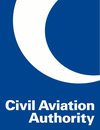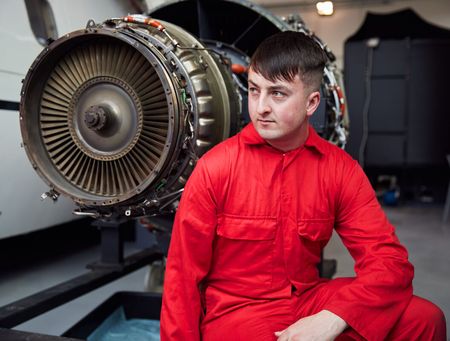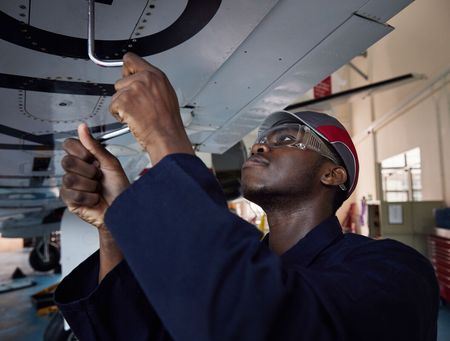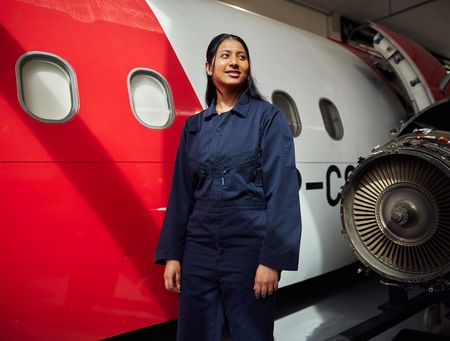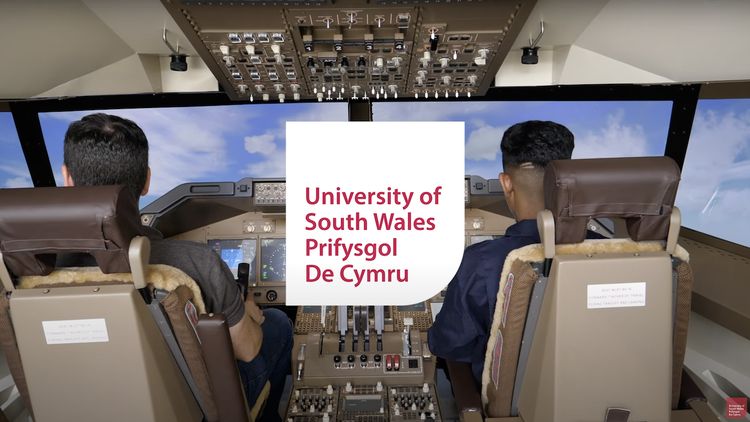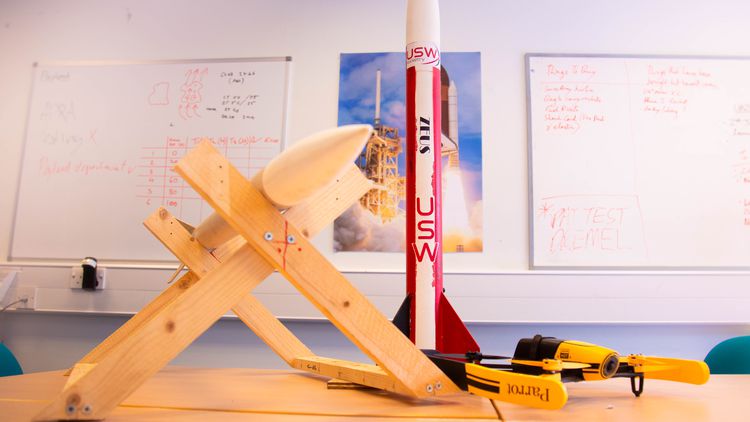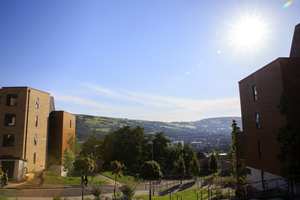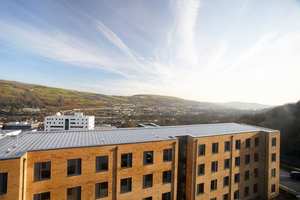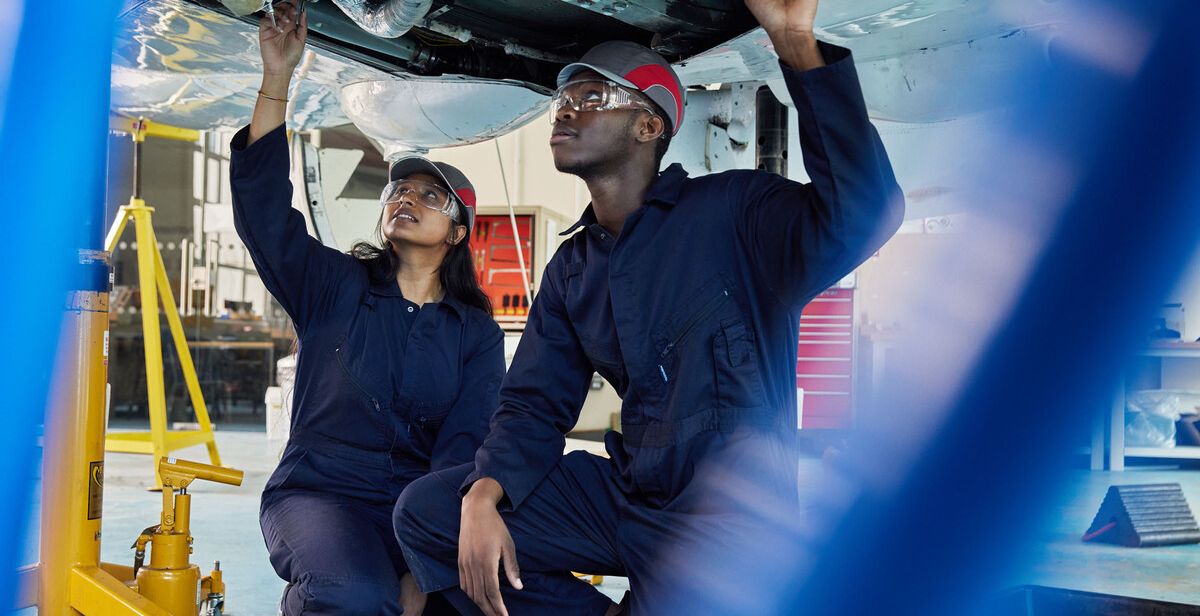
BSc (Hons) Aircraft Maintenance Engineering (Including Foundation Year)
Aeronautical and Aerospace Engineering students rated USW top ten in the UK for assessment, academic support,organisation, learning resources and student voice National Student Survey 2023
If you don’t have the right qualifications to start our BSc (Hons) Aircraft Maintenance Engineering, you could start your studies with a foundation year. The extra year will give you the best possible preparation for success on the degree programme.
Gain a degree at the top university in Wales for aerospace engineering (Guardian University Guide 2023) – plus the qualifications required for the Part-66 B1.1 basic aircraft maintenance licence, achieved through real-world experiences that will help kick-start your career.
You'll join our supportive community on a highly practical course accredited by the UK's Civil Aviation Authority (CAA) and the European Aviation Safety Agency (EASA). It's designed to equip you with everything you'll need to start work after you graduate. The skills you'll develop are in huge demand right now, so you'll be able to work either in the UK or internationally.
Ours is currently the only UK-based course delivering the degree and the EASA-approved Part-66 B1.1 licence on the same campus. We've got excellent connections with the most well-known aviation companies – offering career opportunities to help jumpstart your career and obtain the accelerated Part-66 basic aircraft maintenance licence.
Already have Part-66 qualifications or HND in an aviation-based subject and want to upskill, possibly for a supervisory or managerial role? You can get your degree in a year with our BSc (Hons) Aircraft Engineering and Maintenance Systems Top-Up.
The Foundation Year will give you a good understanding of our engineering courses and provide you with a good numerical background to support you throughout the remainder of the degree. Following your initial foundation year, you will progress onto the modules studied as part of the BSc (Hons) Aircraft Engineering and Maintenance Systems (Including Foundation Year).
Foundation Year: Aircraft Maintenance Engineering
The Foundation Year will give you a good understanding of our engineering courses and provide you with a good numerical background to support you throughout the remainder of the degree. Following your initial foundation year, you will progress onto the modules studied as part of your award.
- Foundations of Mathematics
- Application of Mathematical Skills
- Essential Engineering Skills
- Engineering Project
- Foundation Engineering Principles
- English for Engineering (optional)
- Introduction to Aircraft Maintenance Academic Studies (optional)
Year One: Aircraft Maintenance Engineering
Aircraft are complex machines that incorporate a host of engineering disciplines. An understanding of general science, mathematics, and technology-based subjects are explored to provide the foundations necessary to progress to the more complex subjects related to commercial aircraft.
Aerospace Mechanics(20 Credits)
The content of this module will provide the essential underpinning to understand the aerodynamics and physics related to flight and the control mechanisms used to maintain altitude, speed and direction.
Electronic Fundamentals for Maintenance Engineers (20 Credits) and Electrical Fundamentals for Maintenance Engineers (20 Credits)
These modules will equip you with the foundations in Electrical and Electronic engineering required to progress onto more complex avionics systems.
Aerospace Materials and Hardware (20 Credits)
By studying this module, you will gain a theoretical and practical understanding of the materials and hardware requirements for aircraft design, manufacture and maintenance.
Professional Engineering Techniques (20 Credits)
You will investigate the soft skills that are a vital attribute of any future engineer, including communication skills, professional development planning and critical analysis.
Analytical Methods for Engineers (20 Credits)
This module will provide the mathematical principles to underpin your ongoing studies. The focus is to ensure you have sufficient knowledge and understanding to apply mathematical solutions to aircraft engineering problems.
Year 1 embeds 6 of the 13 modules required to obtain the Part-66 Cat B1.1 licence.
Year Two: Aircraft Maintenance Engineering
This year will expose you to common mechanical and electronic systems found on aircraft. It also introduces you to Human Factors along with an underpinning knowledge of the business practices within the aviation industry.
The Maintenance Practices for B1 Licence (40 Credits)
This module will provide you with the theoretical and practical knowledge necessary to conduct aircraft maintenance tasks and the know-how to complete the required legislative paperwork, a requirement for audit and accountability purposes.
The Aircraft Instrumentation Systems
During this activity, you will be exposed to digital system design techniques, from basic logic systems to embedded system design. You will learn about various sensors typically found on aircraft systems and understand the operation, the process of testing and how to interface them to a digital system.
Fundamentals of Air Transport Management
This module provides you with the knowledge and understanding of airline companies' challenges in maintaining and operating aircraft in a very competitive commercial environment.
Human Factors
Using historical case studies, you will be shown how the research into Human Factors (HF) has influenced and changed the processes and procedures that were once adopted as standard practices.
Maintenance and Repair of Aircraft Propeller Systems
You will gain a detailed knowledge of the theoretical aspects of propeller construction, control, operation, maintenance and storage.
Year 2 embeds 4 of the 13 modules required to obtain the Part-66 Cat B1.1 qualification.
Year Three: Aircraft Maintenance Engineering
The final year of the course has been designed to focus the student's attention on the new and emerging technologies used in MROs and the challenges surrounding the maintenance practices of operating in these organisations.
Employment in a PART-145 organisation (optional 20 credits)
This module will give you the necessary understanding of the operation of a PART-145 MRO organisation. It will provide knowledge and understanding of the MOE requirements and the authority's role in overseeing the organisation, and the organisation's legal requirements. The course also aims to enhance your employability by providing mandatory aviation training in Human Factors, Fuel Tank Safety and Electrical Wiring Interconnection Systems required for working in the industry.
Group Project – PART-145 The Simulated Environment (optional 20 credits)
You will gain an insight into working in a regulated Part-145 MRO organisation by preparing and conducting maintenance activities in terms of the Maintenance Resources and Planning Management requirements. You will work as a team, rotationally taking the lead on a maintenance activity by organising the workforce, project planning and preparing the legislative documents complying with the appropriate authorities.
Aerospace Turbine Propulsion Systems (20 Credits)
You will continue to develop maintenance engineering skills by investigating propulsion systems, their environmental impact and alternative sustainable solutions.
Aero-Structures, Aerodynamics and Systems (20 Credits)
This module is the largest in terms of content and aims to combine the breadth of knowledge gained across all modules and consolidate this to holistically review aircraft maintenance.
Individual Project (optional 40 Credits)
This optional final-year individual project allows you to conduct a self-directed study encompassing the knowledge and practical skills gained over the course. You are expected to derive a project plan that would enable you to undertake a detailed review of an aircraft engineering problem. This will allow you to conduct in-depth research in aircraft maintenance or design an engineering solution to aircraft problems.
Year 3 embeds the remaining 3 modules required to obtain the Part-66 Cat B1.1 qualification.
Featured modules and facilities
You'll complete practical exercises in our state-of-the-art Part 147 Basic Training hangars – a vibrant hub of civilian aircraft and a Boeing 747 simulator. Here you'll provide solutions to real-world problems and learn the engineer's responsibilities in performing the maintenance tasks. The practical content of the course progressively intensifies throughout the levels, which are the parts our students like the most.
All the standard maintenance and audit practices are covered too, so you will complete tasks in line with industry standards from the very start. In year three, you'll either combine modules that embed employability and practical group tasks in our simulated Part-145 environment – or complete a research dissertation in an Individual Project instead. This way, you can shape your degree depending on whether you'd rather go into a managerial, research or practical role.
Teaching
The course is delivered full-time on campus. The Authorities require students to receive 2400 hours of education and training over the three years of study, equating to 27 hours/week of contact time. Students will be in lectures/workshops for 4.5 days per week. You will study 120 university credits and a portion of the 13 Part-66 modules at each level. The type of activities vary, but as you progress through the years, a more intense hands-on practical approach will be adopted, allowing you to gain valuable experience maintaining complex aircraft systems.
Assessment
You will be assessed through assignments, coursework, ongoing class tests and exams. The Part-66 assessments contribute to the overall module mark into which they are embedded. This contribution varies depending on the academic level.
- Year 1 40%
- Year 2 30%
- Year 3 20%
Facilities
The University invested £3.3m into its existing aerospace facilities. A two-storey Aerospace Centre extension adds 1,000m2 of practical workshop and laboratory space for engineering students. This includes two aircraft hangars that house civilian aircraft and flight simulators.
The Aerospace Centre is home to a Jetstream 31 Twin Turboprop aircraft, assembled with Honeywell TPE331 Engines and Rockwell-Collins Proline II Avionics, alongside a section of Airbus A320 fuselage.
The Boeing 747 full flight simulator allows students to simulate ground runs and maintenance activities by interrogating the aircraft's onboard maintenance systems. Students can also try their hand at the take-off and landing of this enormous aircraft
The Centre also includes a gas turbine maintenance workshop, simulated aircraft fuselage riveting area, hand tools workshops, welding bay, and clean and dirty composite workshops for specimens and repairs. Dedicated laboratory space for practical electronic tasks, avionics systems, hydraulics and pneumatics is also a feature, providing students with hands-on practical experience.
Our sub-sonic wind tunnels are used for basic aerodynamic instruction, testing and demonstrations on various aerofoil shapes and configurations.
Our single-seater, full motion, three-axes Merlin MP521 engineering flight simulator can be programmed to simulate any existing aircraft type.
Our Part-147 MTO facilities are fully approved by the Civil Aviation Authority (CAA) and the European Union Aviation Safety Agency (EASA)
Lecturers
- Dr David Scammell - Head of Subject
- Bethan Llewellyn - Course Leader/Training Manager
- Martin Sims
- Gary Dornan
- Michael Bates
- Adrian Pitman
- Emily Simba
- Jason Blackwell
- Adam Stubbs
- Stephen Williams
- Alun Griffiths
- Ian Collins
- Pravin Krishnan
- Shahrizam Ismail
- Craig Thomas
- Lalita Gandhi
- Stephen Union
- Richard Grant
Support
The aircraft maintenance subject area is student-focused, providing a wealth of support mechanisms to ensure our students succeed and enjoy all aspects of the course. We operate an open-door policy and assign a personal academic coach to each student. Progress meetings are arranged to discuss the student's progress, and we offer support in areas that may be causing concern.
We regularly revalidate courses for quality assurance and enhancement
At USW, we regularly review our courses in response to changing patterns of employment and skills demand to ensure we offer learning designed to reflect today’s student needs and tomorrow’s employer demands.
If during a review process course content is significantly changed, we’ll write to inform you and talk you through the changes for the coming year. But whatever the outcome, we aim to equip our students with the skillset and the mindset to succeed whatever tomorrow may bring. Your future, future-proofed.
Contextual offers
We may make you a lower offer based on a range of factors, including your background (where you live and the school or college that you attended for example), your experiences and individual circumstances (as a care leaver, for example). This is referred to as a contextual offer and we receive data from UCAS to support us in making these decisions. USW prides itself on its student experience and we support our students to achieve their goals and become a successful graduate. This approach helps us to support students who have the potential to succeed and who may have faced barriers that make it more difficult to access university. Here is a link to our Contextual Admissions Policy.
Other qualifications and experience
We can also consider combinations of qualifications and other qualifications not listed here may also be acceptable. We can sometimes consider credits achieved at other universities and your work/life experience through an assessment of prior learning. This may be for year one entry, or advanced entry to year two or three of a course where this is possible.
To find out which qualifications have tariff points, please refer to the UCAS tariff calculator.
If you need more help or information or would like to speak to our friendly admissions team, please contact us here
Typical A-Level Offer
DD, 48 tariff points
Typical Welsh BACC Offer
N/A
Typical BTEC Offer
BTEC Extended Diploma Pass Pass Pass or BTEC Diploma Pass Pass
Typical Access to HE Offer
Pass the Access to Higher Education Diploma
Additional Requirements
GCSEs: The University normally requires a minimum 3 GCSEs including Mathematics and English at Grade C/Grade 4 or above, or their equivalent but consideration is given to individual circumstances
International Entry Requirements
We also welcome international applications with equivalent qualifications.
English Requirements
In general, international applicants will need to have achieved an overall IELTS grade of 5.5 with a minimum score of 5.0 in each component.
Full-time fees are per year. Part-time fees are per 20 credits. Once enrolled, the fee will remain at the same rate throughout the duration of your study on this course.
August 2024 - July 2025 Fees
Full-time UK: TBC
Full-time International: £15260
August 2025 - July 2026 Fees
Full-time UK: TBC
Full-time International: TBC
Student Perks
At the University of South Wales, you’re investing in so much more than a degree. We strive to provide our students with the best possible experience, no matter what you chose to study. Whether it’s access to top of the range mac books and PCs, state-of-the-art facilities packed with industry-leading equipment and software, masterclasses and events led by industry experts, or a wide range of clubs and societies to meet likeminded people, better tomorrows start with extra perks.
Each course also has their own unique student benefits to prepare you for the real word, and details of these can be found on our course pages. From global field trips, integrated work experience and free course-related resources, to funded initiatives, projects working with real employers, and opportunities for extra qualifications and accreditations - at USW your future, is future-proofed.
Click here to learn more about student perks at USW.
Additional Costs
As a student of USW, you’ll have access to lots of free resources to support your study and learning, such as textbooks, publications, online journals, laptops, and plenty of remote-access resources. Whilst in most cases these resources are more than sufficient in supporting you with completing your course, additional costs, both obligatory and optional, may be required or requested for the likes of travel, memberships, experience days, stationery, printing, or equipment.
* Obligatory
| Item | Cost | |
|---|---|---|
| Placement | Students who successfully secure on the job training in industry to work towards qualifying for the accelerated licence, would be expected to pay their own travel costs to and from the venue during the period of placement. The cost of this will of course vary and some students have chosen to pay for accommodation close to their place of work for the duration of their placement.
Any fees charged for the practical training will be at the discretion of the EASA Part-145 company and will be the responsibility of the student.
|
UK students
Apply via UCAS if you are a UK-residing applicant, applying for year one of a full-time undergraduate degree, Foundation Year, Foundation Degree or HND and you have not applied through UCAS before. If you are applying to study part-time, to top up your Foundation Degree or HND, or to transfer to USW from another institution, please apply directly.
International and EU students
Apply directly to the University if you live outside the UK.
This Aircraft Maintenance Engineering programme offers excellent career opportunities worldwide. The Part-66 Licence qualifies its holders to be selected for further aircraft-type authorisation before being permitted to sign off aircraft for flight. You can gain employment throughout the UK and across the world with manufacturing companies, commercial airlines, air-taxi operators, flying schools, the armed forces and commercial long-haul flights. There is a growing market for maintenance, repair and overhaul of military and commercial aircraft, or you may choose sub-contract work.
Students who want to embark on a career as an aircraft maintenance engineer should be focused, motivated and ready to commit to an intense academic programme of study.
They must be diligent, hardworking, and committed to providing solutions efficiently and safely. They must be accountable for their work and approach all practical activities responsibly, as many lives rely on their standards.
Students must be passionate about working in the aviation industry and enjoy international travel.
You should be able to adapt, think logically, have exceptional problem-solving skills, and the ability to learn new skills quickly.
Possible Career Options
- Aircraft Maintenance Engineering
- Maintenance Scheduling and Planning
- Aircraft Manufacturing
- General Engineering
Our Careers and Employability Service
As a USW engineering student, you will have access to advice from the Careers and Employability Service throughout your studies and after you graduate.
This includes: one-to-one appointments from faculty based Career Advisers, in person, over the phone or even on Skype and through email via the "Ask a Question" service. We also have extensive online resources for help with considering your career options and presenting yourself well to employers. Resources include psychometric tests, career assessments, a CV builder, interview simulator and application help. Our employer database has over 2,000 registered employers targeting USW students, you can receive weekly email alerts for jobs.
Our Careers service has dedicated teams: A central work experience team to help you find relevant placements; an employability development team which includes an employability programme called Grad Edge; and an Enterprise team focused on new business ideas and entrepreneurship.

